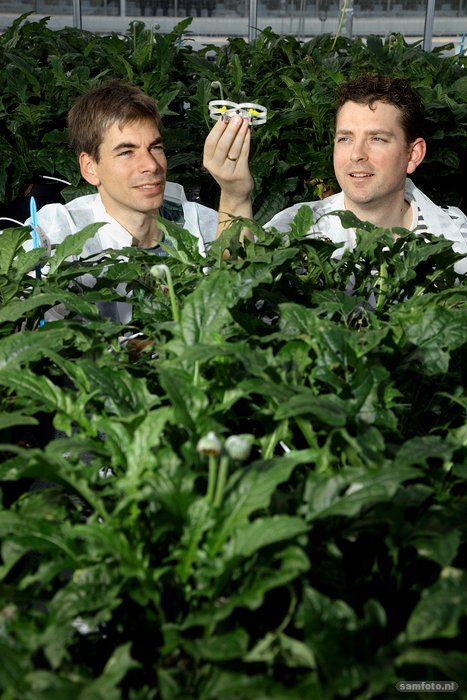The firm - Pats
It was at TU Delft’s MAVlab that two researchers hatched an exciting idea: to combat insects with a drone. Now they run Pats.
It sounds like science fiction – computer-controlled mini-drones plucking insects out of the air at lightning speed – but it’s actually the product being developed by Pats. Founders Kevin van Hecke and Sjoerd Tijmons know each other from their time at TU Delft’s Micro Air Vehicle Laboratory (MAVLab). Brother Bram Tijmons is the third founder. He studied business administration in Rotterdam and takes care of the commercial side of the business.
The idea arose when, one morning in 2016, Sjoerd arrived at the MAVlab completely exhausted. He’d had a bag night’s sleep courtesy of mosquitos buzzing around his room. “We thought: ‘we work in a drone lab; can we come up with anything to tackle this?’ After some trial and error we managed to pluck an insect out of the air with a mini-drone. A few more experiments later, we started to think it might be a marketable product.” The system proved to be less suitable for the bedroom, since it requires an expensive computer and a camera. In the greenhouses in Westland, however, there are possibilities aplenty.
“In glasshouse horticulture, they have a lot of problems with insect pests such as moths,” says Bram. “Those critters lay their eggs all over the place. The caterpillars that emerge cause a lot of damage. You can only control them using insecticide and even that is not always effective. We want to use our drones to pluck the moths out of the air before they reproduce.”
The system is currently being tested in three greenhouses. A camera with infrared light detects the moths and a computer calculates the drone’s path. The mini-drone itself is actually very simple: four plastic propellers with a rechargeable battery and a flight controller. “The drone flies towards the moth at lightning speed and sucks it up through a propeller, creating moth confetti,” says Kevin.
According to Bram, the biggest challenge in business is being able to develop as fast as you want to deliver. “There’s a lot of interest in our system. We are keen to make deals with greenhouse horticulturists, but while the product is still under development, we can’t make any promises.” At the moment, the main revenues are investments and subsidies for the further development of the system, which the company uses to pay two full-time employees and an intern. The aim is to launch the product on the market as soon as possible. “If we can help reduce the use of insecticides at the same time, that would be a nice bonus,” says Bram. “Idealism in business is allowed.”
Company: Pats, Indoor Drone Solutions
Founders: Kevin van Hecke, Sjoerd and Bram Tijmons
Degree Programme: Kevin: MSc in Embedded Systems, Sjoerd: MSc and PhD in Aerospace Engineering, Bram: MSc in Business Administration in Rotterdam
Products: Indoor drones for insect control
Founded in: 2018
Employees: Five full-time (including three founders) and one intern
Turnover: Negligible
In five years' time: A regular feature in greenhouse horticulture, with the system installed in 1000 greenhouses
